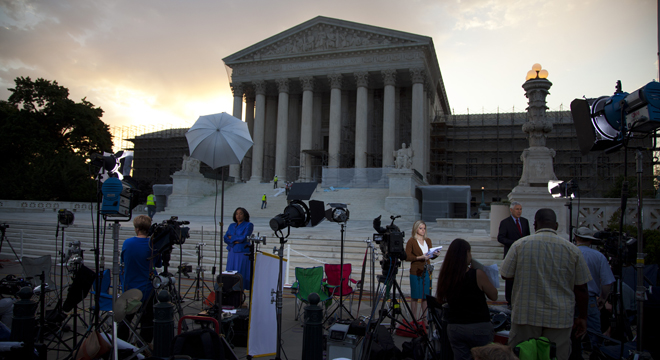A centerpiece of the monumental Voting Rights Act is in jeopardy Wednesday as it heads before the Supreme Court for oral argument.
At issue is the constitutionality of Section 5 of the 1965 law, which requires state and local governments in 16 states to receive preclearance from the Justice Department or a federal court before making any changes to laws that affect voting. The purpose was to proactively snuff out voter discrimination where it’s most likely to emanate, but conservatives argue that it has worked so well it now discriminates against the mostly southern regions covered.
Although Congress has repeatedly reauthorized and the Supreme Court has repeatedly upheld it, Section 5 faces a clear danger now as the Roberts Court’s five conservative-leaning justices signaled their misgivings with it in a 2009 case involving a Texas jurisdiction’s right to “bail out” of the preclearance requirement.
In that 2009 case, the Court refrained from ruling on the underlying constitutional question, but during oral arguments and in eventual written opinions, the five Republican-appointed jurists built their case against that portion of the law — which is why supporters are nervous. Here are some excerpts from that case:
Chief Justice John Roberts
“The evil that §5 is meant to address may no longer be concentrated in the jurisdictions singled out for preclearance. The statute’s coverage formula is based on data that is now more than 35 years old, and there is considerable evidence that it fails to account for current political conditions. For example, the racial gap in voter registration and turnout is lower in the States originally covered by §5 than it is nationwide. …
“Things have changed in the South. Voter turnout and registration rates now approach parity. Blatantly discriminatory evasions of federal decrees are rare. And minority candidates hold office at unprecedented levels. … These improvements are no doubt due in significant part to the Voting Rights Act itself, and stand as a monument to its success.” —Northwest Austin Municipal v. Holder majority opinion, June 22, 2009
Justice Anthony Kennedy
“No one — no one questions the validity, the urgency, the essentiality of the Voting Rights Act. The question is whether or not it should be continued with this differentiation between the States. And that is for Congress to show. …
“But yet — yet the Congress has made a finding that the sovereignty of Georgia is less than the sovereign dignity of Ohio. The sovereignty of Alabama is less than the sovereign dignity of Michigan. And the governments in one are to be trusted less than the governments than the other.” —Northwest Austin Municipal v. Holder oral argument, April 29, 2009.
Justice Antonin Scalia
“You’re subject to preclearance and you cannot make changes without going to the Attorney General and asking for his permission. Is it any different from, from a — a Federal law prohibiting certain speech? Do you have to subject yourself to the — to the penalty for that speech before you can attack the law? I don’t think so. …
“If you want to make this a voluntary system, that’s something entirely different, but the question is assuming a State or — or a covered jurisdiction does not want to be in, do you have the right to coerce them to be in? That’s all we’re talking about.” —Northwest Austin Municipal v. Holder oral argument, April 29, 2009.
Justice Samuel Alito
“If these statistics are correct, the difference between Latino registration and white registration in Texas was 18.6 percent, which is not good, but it’s substantially lower than the rate in California, which is not covered, 37 percent; Colorado, 28 percent; New Mexico, 24 percent; the nationwide average, 30 percent. …
“Wouldn’t you agree that there is some oddities in this coverage formula? Isn’t — is it not the case that in New York City the Bronx is covered and Brooklyn and Queens are not?” —Northwest Austin Municipal v. Holder oral argument, April 29, 2009.
Justice Clarence Thomas
“Regardless of the Court’s resolution of the statutory question, I am in full agreement that this case raises serious questions concerning the constitutionality of §5 of the VRA. …
“I conclude that the lack of current evidence of intentional discrimination with respect to voting renders §5 unconstitutional. The provision can no longer be justified as an appropriate mechanism for enforcement of the Fifteenth Amendment.” —Northwest Austin Municipal v. Holder partial dissent, June 22, 2009










